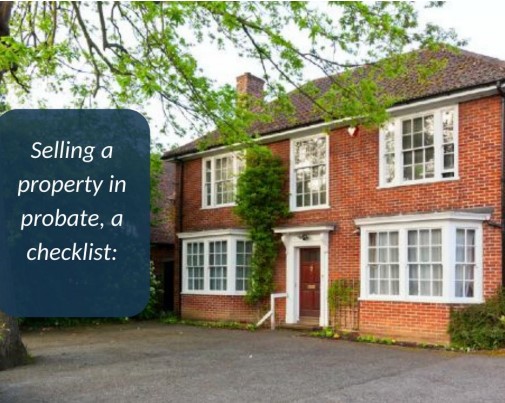Selling a house after the death of parent
The loss of a family member is never easy, whatever the circumstances. The grief from a bereavement can make practical issues, such as selling a house after the death of a parent, even more stressful and daunting. Especially if it’s the childhood home, or if there are multiple beneficiaries from any will.
Selling the property doesn’t have to add to the stress and trauma of your loss. For many people, the priority is to get the process completed as quickly and simply as possible. This lets you settle any final expenses, distribute any proceeds, and focus on your emotional needs and other responsibilities.
Understanding the requirements, and options available, for selling a house after the death of a parent will hopefully allow you to navigate through a difficult time in a more manageable way.
Do you need probate to sell a house?
If you’re named in your parent’s will as an executor, you can apply for probate. This is the formal permission required to deal with someone’s property, money and possessions after their death, and your right will be confirmed in a grant of probate.
When a parent doesn’t leave a will, you would need to apply to become an administrator of their estate, which offers the same legal rights. In this case, you’ll receive a letter of administration. Otherwise, an administrator will be appointed as the executor.
In most cases you need probate to sell a house. The only exception is if the property was jointly owned, when it will automatically pass to the other named party (the process is different if it was jointly owned as ‘tenants in common’ when the percentage share of the home is allocated according to the will of the deceased).
You can advertise, hold viewings and even accept an offer on the house before being issued with a grant of probate or letter of administration. But it’s not recommended to exchange contracts, as you will be unable to complete the sale, and any delay in the probate could mean your sale falls through.
Probate should be granted within four weeks of your application. But you’ll need to estimate the value of the estate, including any property, before applying. You’ll need to list assets and liabilities on a return of estate information form, and calculate whether inheritance tax will need to be paid.
It’s important to get an accurate valuation, as the person named on the grant of probate has a legal responsibility to sell the house for the open market value. If the property is sold for less, any beneficiaries can require the probate to cover any difference.
If there are multiple executors or administrators dealing with the estate, you will have to agree on all decisions, including the sale price. The earlier this can be done, the quicker any sell can take place.
The costs of selling an inherited house or property
The application free for a grant of probate is £215, but you’ll also need to into account any fees and costs. These can include solicitors, surveyors and estate agents. Or if you pay for any work to repair and improve the property before a sale.
You’ll need to report the value of the estate to HM Revenue and Customs, regardless of the total amount. And if the value is above £325,00, then Inheritance Tax will usually need to be paid.
Inheritance Tax is paid by the estate on any amount over the £325,000 threshold, at a rate of 40%. But there are different thresholds and rates if a percentage, or the whole estate, is given to charity, or if it’s willed to a spouse, civil partner or a community amateur sports club.
If you’ve previously inherited a house which you wish to sell at a later date, then you may be liable for Capital Gains Tax, which is charged at different rates depending on whether it’s your residential property. And if you’re currently paying basic rate or higher rate Income Tax. The amount will be based on the valuation when you applied for probate.
The specific amounts will depend on your individual circumstances, but any fees, or genuine upgrades and improvements, can potentially be deducted from the amount liable for Capital Gains Tax, so it’s important to keep all receipts and paperwork.
Obviously, it’s a good idea to speak with accountants or financial advisors who specialise in tax to ensure you can get the best outcome.
Looking after the property
You’ll need to contact the current insurance provider to inform them about the change in circumstances. And to also to discuss your options, as most policies will not include covering a house which is left empty in the short or long-term. You may need new insurance for the time the property will be left unoccupied.
As an executor of the estate, you’ll also have a duty to safeguard all assets. This could include changing the locks if multiple people had access, and ensuring that utilities and appliances are left safe while the property is uninhabited. Even a minor leak can turn into a major issue with no-one to notice it for days or weeks.
You’ll also need to make sure council tax, utility bills and other accounts are updated, and the costs covered.
One benefit of selling to National Homebuyers is that we can be flexible, and ready to complete an offer quickly, meaning that you don’t have to maintain an empty property for months.
How to sell a house after the death of a parent
Apart from the need for probate, the actual sales process of the house will be similar to any other property.
Removing personal items and furniture may be a traumatic experience, so you may want to allow extra time to organise everything if you’re not using a house clearing service. The support of friends and family can make it an easier process, along with hiring an appraiser to value anything you intend to sell. They will also help you to check that nothing important is thrown away or lost, which could include important paperwork such as the title deeds to prove ownership if the property is unregistered.
You can then decide if any repairs or improvements are worth making before selling the house. Minor fixes can make a big difference, and an estate agent can recommend whether a more sizeable investment will achieve a quicker sale or higher price.
You can list the property yourself, use an estate agent or online service, offer it at auction, or speak to a home buying service for a fast valuation and cash offer. The advantage of estate agents and home buying services are that they will have experience of dealing with similar house sales, and understand what is involved or legally required.
And with National Homebuyers, we can not only help you through the process of selling the property, but you’ll save on estate agent costs, and potentially get assistance with some of your legal fees. If probate is in place, and you’re happy with our valuation, the completed sale can result in money paid within seven days. Which means you can quickly move on with your life, and make the most of any inheritance.






